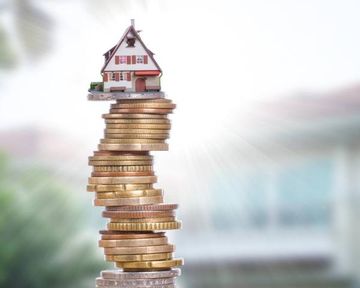Home loan or cash? What you need to know when buying a home.
Buying a home is a significant financial commitment, and if you have enough funds to pay in cash, the idea of owning your property outright might be tempting.
Avoiding monthly home loan payments, interest rates, and loan approvals sounds appealing—but is paying cash the best choice? Before making such a substantial decision, weighing the pros and cons of a cash purchase against taking out a home loan is essential.
Here, we’ll guide you through the advantages and disadvantages of each option, so you can make an informed decision that aligns with your financial goals and future plans.
What are the advantages of a cash purchase?
-
You will save money by not paying interest on a home loan for 20 years. This may seem like an especially attractive proposition if you can then invest at least some of the money you save each year into a tax-free savings account.
-
You will avoid having to worry about being approved for a loan – and the bond registration costs.
-
Your credit record will also not come into question – which could be a major factor if you have had some money trouble in the past that you think might prevent you from being able to secure a loan.
-
You will have 100% equity in your home, which you should theoretically be able to access if you need money for an emergency – and you may find personal satisfaction in owning your home “outright”.
-
You will be an attractive buyer to serious sellers, and the prospect of being able to conclude a faster, simpler deal may even enable you to negotiate a better price.
What ar the disadvantages of a cash purchase?
-
You will lose liquidity. For most people, buying a home for cash will most likely mean that all the money they currently have – or at least a large percentage of it - will be tied up in one asset, leaving little to spare for other investments or savings or emergencies.
-
If you only want to invest in property, you should seriously consider spreading your risk by using your cash to put down deposits on two or more homes and obtaining a loan for the remainder of the purchase price in each case. There could also be tax benefits in owning one or more rental properties, as well as the possibility of better returns on your capital.
-
You will have no gearing protection. If all your money is in your home and property prices drop, you will suffer that percentage drop on the whole amount you paid. For example, if the cash purchase price was R1m and the market were to drop by 10%, you would lose R100 000 worth of value. But if you obtained a loan and only paid a R100 000 deposit in cash, your loss should prices drop 10% would only be R10 000, with the bank bearing the loss on the remainder.
-
Property can take weeks or months to sell, which can be a problem if you need money quickly. Even trying to raise a home loan against your paid-for property can take too long if you have a real emergency.
-
No bank valuation. When you apply for a home loan, the bank will usually send a valuator to see that there is sufficient value in the property to justify the purchase price. This will not happen if you buy for cash, so you will have no “third-party” confirmation that you are not overpaying.
Choosing between paying cash or taking out a home loan for your home purchase is a personal decision that depends on your financial goals, risk tolerance, and long-term plans. Before making a final choice, consider consulting a financial advisor to assess your situation comprehensively. Professional advice can help you understand how a cash purchase or home loan might impact your liquidity, tax obligations, and potential investment returns.
If you’re leaning towards a home loan, use our bond repayment calculator to get an estimate of monthly payments based on different loan amounts, terms, and interest rates. This tool can help you plan your budget and visualize how a home loan might fit into your financial picture.
Taking the time to evaluate both options carefully will ensure that your decision is well-informed and aligns with your future financial security.

